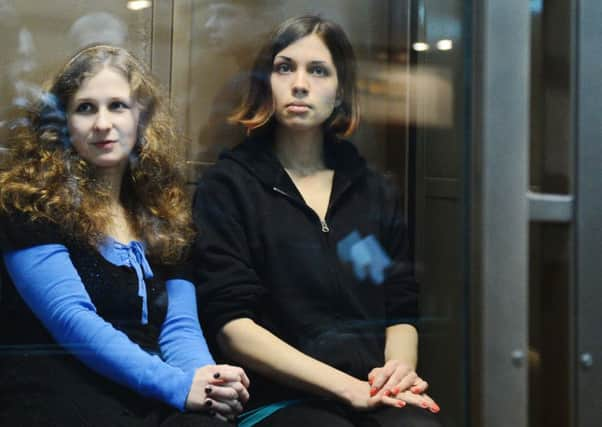Russia: Pussy Riot and Arctic 30 to get amnesty


Such an outcome would remove two of many irritants in ties with the West before Russia hosts the Winter Olympics in February. Concern over Russia’s treatment of homosexuals is already threatening to cloud the atmosphere at the Sochi Games.
The Duma, or lower house, yesterday approved the amnesty proposed by president Vladimir Putin to mark the 20th anniversary of the passage of Russia’s post-Soviet constitution.
Advertisement
Hide AdAdvertisement
Hide AdHuman rights activists say the amnesty was far too narrow, freeing only a tiny fraction of Russia’s 700,000 prisoners.
It will not benefit prominent foes of Mr Putin such as jailed tycoon Mikhail Khodorkovsky or opposition leader Alexei Navalny. Mr Navalny will be kept out of elections for years by a theft conviction he says was politically motivated.
But lawyers said it would lead to the early release of Pussy Riot members Nadezhda Tolokonnikova and Maria Alyokhina, whose two-year sentences over an anti-Putin protest in the main Moscow Orthodox cathedral have been criticised in the West as excessive.
Greenpeace said an amendment added hours before the vote would almost certainly end legal proceedings against 30 people who faced jail terms of up to seven years over a protest at an offshore oil platform in September, allowing the 26 foreigners among them, from 17 countries, to go home.
“We have good news,” Greenpeace Russia said on Twitter. “The Duma has voted to grant amnesty to the Greenpeace activists.”
The arrest of the men and women, dubbed the “Arctic 30”, and seizure of their boat, the Arctic Sunrise, also drew western criticism and was widely seen as a signal that Mr Putin will not tolerate efforts to stop Russia’s development of the resource-rich region
A lawyer for Tolokonnikova and Alyokhina, whose prison terms end in March, said she hoped they would walk free within days.
“It’s a very narrow amnesty. I’m very glad it applies to my clients,” lawyer Irina Khrunova said.
Advertisement
Hide AdAdvertisement
Hide AdThe amnesty will take effect when published in the official government gazette, which is expected today.
The “Arctic 30” were arrested after Russian coast guards boarded the Greenpeace icebreaker following an 18 September protest in which some of the activists tried to scale Russia’s first offshore oil platform in the Pechora Sea. They were threatened with charges of piracy but eventually charged with hooliganism, jailed in stark conditions for two months and have been unable to leave Russia since their release on bail.
“I might soon be going home to my family, but I should never have been charged and jailed in the first place,” Greenpeace quoted Arctic Sunrise’s US captain Peter Willcox as saying.
“We sailed north to bear witness to a profound environmental threat but our ship was stormed by masked men wielding knives and guns … We were never the criminals here.”
Mr Putin, accused by his critics of curbing democracy during 14 years in power and stifling dissent in his third presidential term, said last month the amnesty should “underscore the humanism of our state” by releasing elderly, disabled and female prisoners. But members of Mr Putin’s own human rights council estimate it will free fewer than 1,500 convicts.